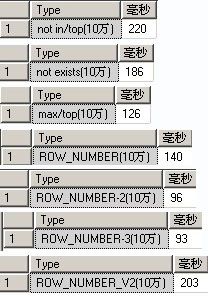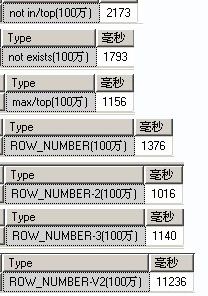几种常见SQL分页方式效率比较
分页很重要,面试会遇到。不妨再回顾总结一下。
1.创建测试环境,(插入100万条数据大概耗时5分钟)。
create database DBTest use DBTest --创建测试表 create table pagetest ( id int identity(1,1) not null, col01 int null, col02 nvarchar(50) null, col03 datetime null ) --1万记录集 declare @i int set @i=0 while(@i<10000) begin insert into pagetest select cast(floor(rand()*10000) as int),left(newid(),10),getdate() set @i=@i+1 end
2.几种典型的分页sql,下面例子是每页50条,198*50=9900,取第199页数据。
--写法1,not in/top select top 50 * from pagetest where id not in (select top 9900 id from pagetest order by id) order by id --写法2,not exists select top 50 * from pagetest where not exists (select 1 from (select top 9900 id from pagetest order by id)a where a.id=pagetest.id) order by id --写法3,max/top select top 50 * from pagetest where id>(select max(id) from (select top 9900 id from pagetest order by id)a) order by id --写法4,row_number() select top 50 * from (select row_number()over(order by id)rownumber,* from pagetest)a where rownumber>9900 select * from (select row_number()over(order by id)rownumber,* from pagetest)a where rownumber>9900 and rownumber<9951 select * from (select row_number()over(order by id)rownumber,* from pagetest)a where rownumber between 9901 and 9950 --写法5,在csdn上一帖子看到的,row_number() 变体,不基于已有字段产生记录序号,先按条件筛选以及排好序,再在结果集上给一常量列用于产生记录序号 select * from ( select row_number()over(order by tempColumn)rownumber,* from (select top 9950 tempColumn=0,* from pagetest where 1=1 order by id)a )b where rownumber>9900
3.分别在1万,10万(取1990页),100(取19900页)记录集下测试。
测试sql:
declare @begin_date datetime declare @end_date datetime select @begin_date = getdate() <.....YOUR CODE.....> select @end_date = getdate() select datediff(ms,@begin_date,@end_date) as '毫秒'
1万:基本感觉不到差异。
10万:
100万:
4.结论:
1.max/top,ROW_NUMBER()都是比较不错的分页方法。相比ROW_NUMBER()只支持sql2005及以上版本,max/top有更好的可移植性,能同时适用于sql2000,access。
2.not exists感觉是要比not in效率高一点点。
3.ROW_NUMBER()的3种不同写法效率看起来差不多。
4.ROW_NUMBER() 的变体基于我这个测试效率实在不好。原帖在这里 http://topic.csdn.net/u/20100617/04/80d1bd99-2e1c-4083-ad87-72bf706cb536.html
PS.上面的分页排序都是基于自增字段id。测试环境还提供了int,nvarchar,datetime类型字段,也可以试试。不过对于非主键没索引的大数据量排序效率应该是很不理想的。
5.简单将ROWNUMBER,max/top的方式封装到存储过程。
ROWNUMBER():
create proc [dbo].[spSqlPageByRownumber] @tbName varchar(255), --表名 @tbFields varchar(1000), --返回字段 @PageSize int, --页尺寸 @PageIndex int, --页码 @strWhere varchar(1000), --查询条件 @StrOrder varchar(255), --排序条件 @Total int output --返回总记录数 as declare @strSql varchar(5000) --主语句 declare @strSqlCount nvarchar(500)--查询记录总数主语句 --------------总记录数--------------- if @strWhere !='' begin set @strSqlCount='Select @TotalCout=count(*) from ' + @tbName + ' where '+ @strWhere end else begin set @strSqlCount='Select @TotalCout=count(*) from ' + @tbName end --------------分页------------ if @PageIndex <= 0 begin set @PageIndex = 1 end set @strSql='Select * from (Select row_number() over('+@strOrder+') rowId,'+ @tbFields +' from ' + @tbName + ' where 1=1 ' + @strWhere+' ) tb where tb.rowId >'+str((@PageIndex-1)*@PageSize) +' and tb.rowId <= ' +str(@PageIndex*@PageSize) exec sp_executesql @strSqlCount,N'@TotalCout int output',@Total output exec(@strSql)
Max/top:(简单写了下,需要满足主键字段名称就是"id")
create proc [dbo].[spSqlPageByMaxTop] @tbName varchar(255), --表名 @tbFields varchar(1000), --返回字段 @PageSize int, --页尺寸 @PageIndex int, --页码 @strWhere varchar(1000), --查询条件 @StrOrder varchar(255), --排序条件 @Total int output --返回总记录数 as declare @strSql varchar(5000) --主语句 declare @strSqlCount nvarchar(500)--查询记录总数主语句 --------------总记录数--------------- if @strWhere !='' begin set @strSqlCount='Select @TotalCout=count(*) from ' + @tbName + ' where '+ @strWhere end else begin set @strSqlCount='Select @TotalCout=count(*) from ' + @tbName end --------------分页------------ if @PageIndex <= 0 begin set @PageIndex = 1 end set @strSql='select top '+str(@PageSize)+' * from ' + @tbName + ' where id>(select max(id) from (select top '+str((@PageIndex-1)*@PageSize)+' id from ' + @tbName + ''+@strOrder+')a) '+@strOrder+'' exec sp_executesql @strSqlCount,N'@TotalCout int output',@Total output exec(@strSql)
园子里搜到Max/top这么一个版本,看起来很强大,调用:
declare @count int --exec [dbo].[spSqlPageByRownumber]'pagetest','*',50,20,'','order by id asc',@count output exec [dbo].[spSqlPageByMaxTop]'pagetest','*',50,20,'','order by id asc',@count output select @count

